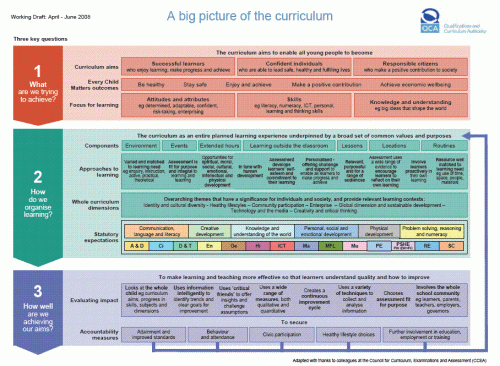… applies to England and Wales, I believe. Have a look for yourself:

Nice and colourful, is it not?
I am unsure as to how many people actually care to look at it, and not simply take it for granted that the government’s idea of a sound education is concordant with their own. For one, note that Mathematics is cited under “Personal, social and emotional development”. I am not sure how many pupils would disagree with that particular statement.
As I get on with blogging, I do find that research sometimes brings me information I did not wish to know, e.g. the fact that one of the GCSE Science exams is now composed of multiple choice questions, and contains considerable quantities of social science and economics. So amidst the unpleasantries, I was intrigued to be presented with “The Big Picture”. What it is all about. And it is rather lovely I say – all about making sure young children grow up to be happy, healthy and conscientious adults. Then, as we progress through the stages of education we may not feel that being at school makes us particularly happy or healthy; and I feel that the increasing focus on society as a whole -through education- may not be completely beneficial. Pupils are shown what society is like today, and sometimes asked how they would change it for the better (from their point of view), which is a good idea, but I still prefer the old method where each subject is taught in its pure form, which allows young people to use that knowledge to create a completely new world. It may be far fetched, but children should be able to dream without having to mind reality.

I certainly agree with you regarding teaching subjects in their pure form. While it is important to learn how the sciences interact with each other and the world, a homogeneous approach to science teaching would be quite restrictive in other ways, in my view. Teach the pure science first and then go on to how it can be applied.
Even with a physics degree, the idea of learning how sociology and economics fit into it is daunting…
Why on Earth is maths in that category? My mind is actually boggled.
Thanks for sharing!